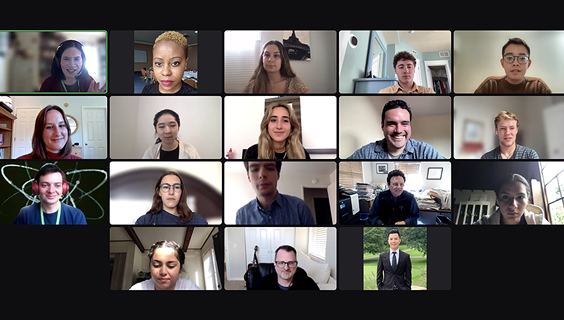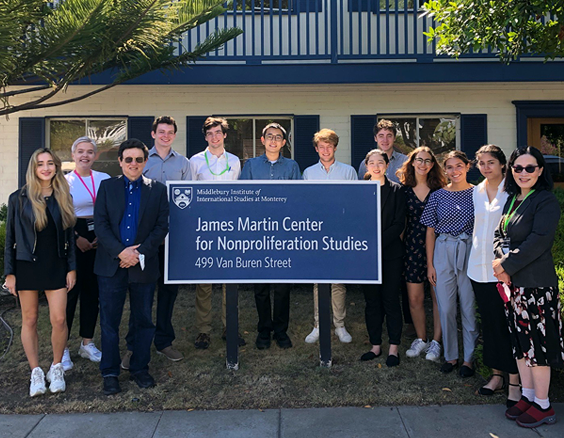June 21, 2022
Masako Toki
The 2022 Summer Undergraduate Nonproliferation Fellowship Program at the James Martin Center for Nonproliferation Studies (CNS) of the Middlebury Institute of International Studies at Monterey (MIIS) started on June 6th. This year, CNS decided to conduct the program in a hybrid format including in-person and online participants. Despite the still lingering COVID-19 pandemic, and necessary restrictions, CNS continues to enhance youth education and training for a more secure and peaceful world.

Screens of 18 participants during an online meeting.
This summer, CNS carefully chose 12 outstanding undergraduate fellows, including two international students, with diverse backgrounds from around the country. Each fellow was selected through a rigorous and competitive application process. Participating fellows represent some of the nation’s top schools, including Indiana University, Brown University, the College of William and Mary, Middlebury College, Pomona College, Trinity Washington University, University of Georgia, and University of Michigan Ann Arbor.
While the majority of fellows are majoring in political science or international affairs, many of fellows are also double majoring in, minoring in, or focusing on, a variety of fields such as Russian, Slavic Languages and Cultures, Classics, and environment. Most of fellows have advanced foreign language skills. CNS is eager to incorporate these young creative minds in nonproliferation and disarmament studies.
On the Job Training
During the summer program, fellows receive invaluable on the job training and work closely with CNS experts on ongoing research and education projects. Fellows also participate in an engaging lecture series that covers issues relating to nonproliferation, disarmament, and arms control. Specific lecture topics include an overview of international nonproliferation regimes, US-Russia nonproliferation issues, and regional proliferation challenges. Scientific aspects of nuclear weapons, current challenges in nuclear disarmament, export controls, open-source tools for nonproliferation, and the media and nonproliferation are topics that are also covered.

Furthermore, fellows have the opportunity to undertake an independent research project with mentorship from CNS experts. The independent research project gives fellows a potential publishing opportunity in a relevant field.
CNS continues to effectively train future leaders to combat the spread of weapons of mass destruction by rethinking the possibilities of communication and learning despite challenging circumstances. CNS remains steadfast to our commitment to nonproliferation and disarmament education.
About the CNS Undergraduate Program
As a part of efforts to promote nonproliferation education among the next generation, CNS started the Summer Undergraduate Fellowship Program in 1997. Since then, fellows have come from a variety of academic majors. The program accepts highly qualified domestic and international students and runs from early June through late August.
This year’s summer program is funded by the Tom and Sarah Pattison Fund, the Earle Family Fund for International Education, CV Starr Foundation, the Howard and Anne Morgens Fund, and the Carnegie Corporation of New York.
